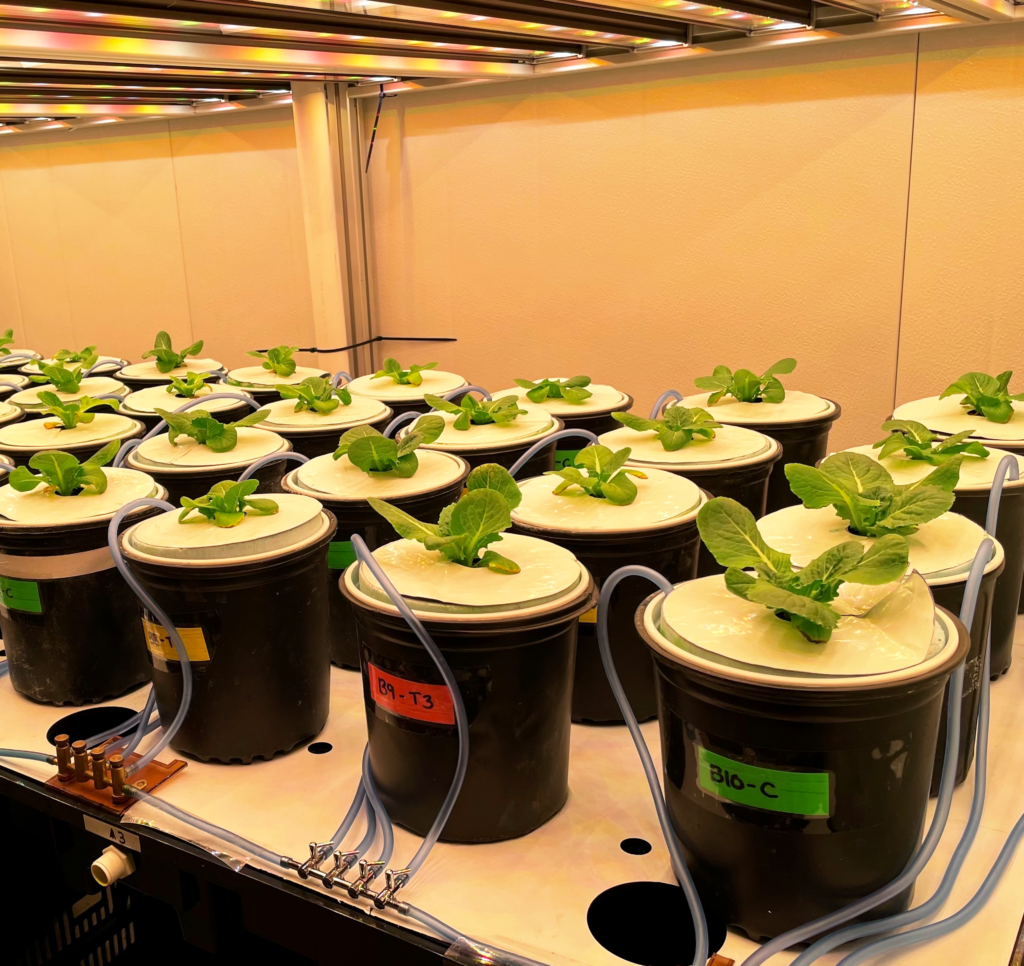
Challenge: Can a novel, algae-based biopolymer be used as a biostimulant in hydroponic crop production? Solution: Conduct dose-response trials in controlled environment growth chambers to examine the biopolymer’s effects on plant growth Impact: Reduced reliance on synthetic fertilizers in hydroponic crop production
Controlled environment agriculture (CEA) is emerging as a sustainable production strategy for a variety of fresh vegetable crops. CEA crops are generally grown using hydroponic systems, which are broadly defined as any soilless crop production system that uses a liquid nutrient solution to supply nutrients to the rootzone.
Compared to soil-based production methods, hydroponic systems offer many advantages in terms of yield, quality and spatial footprint – however, they are often reliant on synthetic fertilizer salts as a nutrient source. Fortunately, fertilizer use can be minimized by optimizing nutrient use efficiency. One way to achieve this is by improving plant uptake and utilization of available nutrients in the rootzone through the application of supplementary plant growth enhancement products called biostimulants.
MetaFLO Technologies (“MetaFLO”) is a Mississauga-based company that markets and distributes chemical reagents with application potential in a variety of industries, including the agricultural sector. The company is in the process of expanding its portfolio to include a new reagent: an algae-based, organic polymer formulated for use as a biostimulant.
With contributions from the Greenhouse Technology Network (GTN), MetaFLO provided research funding to the University of Guelph’s Controlled Environment Agriculture Research Facility (CESRF) to further explore the potential biostimulant effects of the polymer in hydroponic production systems.
“The University of Guelph was the obvious choice for conducting this study given their stellar reputation in controlled environment systems research”
~ Pompi Malik, CEO of MetaFLO
“Food cost and quality are intrinsically linked to production and transportation costs. By allowing controlled environment farming operations the ability to grow healthier plants faster, MetaFLO’s biostimulant will allow local farmers to increase yields while lowering production costs. The University of Guelph was the obvious choice for conducting this study given their stellar reputation in controlled environment systems research,” says Pompi Malik, CEO of MetaFLO.
Utilizing the facility’s state-of-the-art plant growth chambers, CESRF researchers designed and implemented a series of dose-response experiments to determine the polymer’s effects on three hydroponically grown crop species – lettuce, beans and radish. The results of these preliminary trials were promising and paved the way for a larger, more in-depth research partnership between MetaFLO and CESRF.
Improvements in agricultural productivity are necessary to support the demands of a growing human population. However, resources such as fertilizer have become increasingly expensive due a variety of economic, political and environmental factors. The results of this project – in conjunction with the ensuing research partnership – will contribute towards developing innovative methods for sustainable intensification by potentially reducing reliance on fertilizer inputs in hydroponic crop production.
This project was funded by the Government of Canada through the Federal Economic Development Agency for Southern Ontario.
Visit University of Guelph’s Controlled Environment Systems Research Facility (CESRF) page to learn more about its resources and capabilities.






